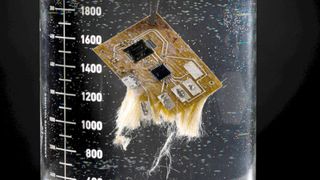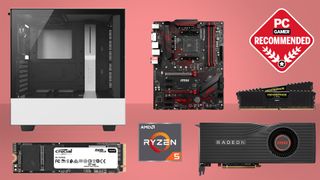Water soluble circuit boards are an e-waste game changer
Bear witness to the world’s first fully recyclable commercialised PCB substrate that will dissolve in a bath of hot water.

We're all aware that e-waste is a big problem, at this point. When they're not strewn across our own floors, mountains of hard drives are being unnecessarily wasted every year and the figures for how much e-waste is generated per-year are startling.
But rather than watching piles and piles of the stuff grow, there are companies out there doing something about it. One great way to tackle e-waste is to recycle electronic parts, since they're an untapped source of rare Earth materials. Then, of course there's the potential for a complete change in materials.
Rather than coming up with new ways to fix things after the fact, semiconductor manufacturer Infineon technologies AG has gone back to the source itself, and is looking to utilise a plant-based PCB design known as the Soluboard. Designed by a British start-up Jiva Materials, not only do these eco boards "have a significantly lower carbon footprint than traditional glass fibers", they also dissolve in water (via ComputerBase).
The company has been working in accordance with the circular economy of the European Commission's Green Deal, and the WEEE (Waste Electrical and Electronic Equipment) Directive, to research new ways to tackle e-waste, all without losing out on precious materials. What's great about this design is that dissolving these boards in water doesn't just break them down so their other valuable components are lost to the ether.
"Adopting a water-based recycling process can lead to greater efficiencies in recovering valuable metals," says Jonathan Swanston, CEO and co-founder of Jiva Materials.

Best CPU for gaming: The top chips from Intel and AMD
Best gaming motherboard: The right boards
Best graphics card: Your perfect pixel-pusher awaits
Best SSD for gaming: Get into the game ahead of the rest
"In addition, replacing FR-4 PCB materials with Soluboard would result in a 60 percent reduction in carbon emissions—more specifically, 10.5kg of carbon and 620g of plastic can be saved per square meter of PCB." That's not a bad set of figures if they can pull it off at the scale of current circuit board use.
Right now, Jiva is working with some unnamed companies to produce advanced beta prototypes of the boards, but due to their simplicity and reusability we could well see these being adopted by big tech companies around the world, as we move into a more eco-conscious future.
The biggest gaming news, reviews and hardware deals
Keep up to date with the most important stories and the best deals, as picked by the PC Gamer team.

Screw sports, Katie would rather watch Intel, AMD and Nvidia go at it. Having been obsessed with computers and graphics for three long decades, she took Game Art and Design up to Masters level at uni, and has been rambling about games, tech and science—rather sarcastically—for four years since. She can be found admiring technological advancements, scrambling for scintillating Raspberry Pi projects, preaching cybersecurity awareness, sighing over semiconductors, and gawping at the latest GPU upgrades. Right now she's waiting patiently for her chance to upload her consciousness into the cloud.
Most Popular






